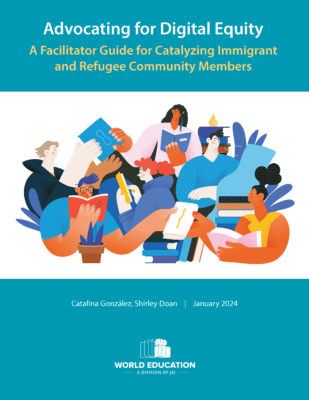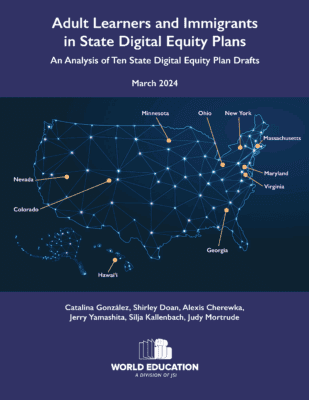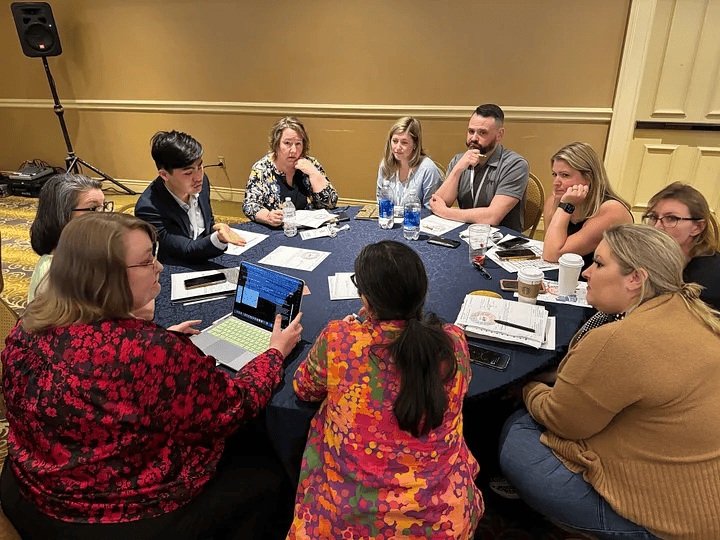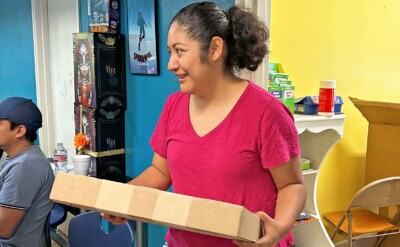Centering Adult Learners in Digital Equity:

By Shirley Doan
This blog post is the second in the Digital Equity at World Education series, which recaps our recent and ongoing digital inclusion work at multiple levels. Read the preceding post, Making an Impact on the Digital Divide: Device Distribution in Tupelo, MS, and check out our Digital Equity page to view all of our resources on digital equity and inclusion.
According to a 2020 report from Digital US, 18 million households in the U.S. still do not have access to the internet, and 32 million adults cannot use a computer. In recognition of this digital divide—and its impact on historically underserved communities—the Biden-Harris administration passed the Digital Equity Act in 2021, which “[aims] to ensure that all people and communities have the skills, technology, and capacity needed to reap the full benefits of our digital economy” via three programs:
- The Digital Equity State Planning Grant, or $60 million to states to develop a Digital Equity Plan;
- The Digital Equity State Capacity Grant, or $1.44 billion to states to implement their Digital Equity Plan; and
- The Digital Equity Competitive Grant, or $1.25 billion to eligible entities to implement digital inclusion activities.
Among those prioritized by the Digital Equity Act include individuals with a language barrier—our adult learners. The definition of individuals with a language barrier includes both English learners (i.e., people who have a native language other than English and limited English proficiency) and those with low levels of literacy (people who are native speakers of English but do not have a functional level of English reading, writing, or speaking). But the overwhelming majority of adult learners also belong to other prioritized groups. In other words, the Digital Equity Act prioritizes everyone who benefits from adult education.
Through the Transforming Immigrant Digital Equity (TIDE) project, World Education has supported adult education and immigrant inclusion leaders and providers in advocating for the inclusion of adult learners—especially immigrant and refugee English learners—in states’ Digital Equity Act activities for the past two years. With 12 resources published to support advocacy, 31 presentations delivered to build community awareness, and 43 partners and networks reached, we’ve uplifted the critical work that our fields have been doing for years.
 Our most recent resource from TIDE is Adult Learners and Immigrants in State Digital Equity Plans, a report that examines the drafts of ten State Digital Equity Plans, focusing on where adult education and immigrant inclusion were meaningfully included.
Our most recent resource from TIDE is Adult Learners and Immigrants in State Digital Equity Plans, a report that examines the drafts of ten State Digital Equity Plans, focusing on where adult education and immigrant inclusion were meaningfully included.
Throughout TIDE, we also emphasized the importance of centering the voices of the people whom we serve. Advocating for Digital Equity: A Facilitator Guide for Catalyzing Immigrant and Refugee Community Members built on this work by supporting immigrants’ and refugees’ right to tell their own stories and lived experiences with the digital divide. For there to be equity in the English language learning and digital resilience ecosystem, we must center the experiences and expertise of adult immigrants and refugees, and recognize them as not only learners or recipients of services, but also co-designers, subject matter experts, community advocates, and perhaps most importantly, agents of change.
Of course, this work would not be possible without our partners, collaborators, and networks. For example, in preparation for the upcoming Digital Equity Competitive Grant we partnered with several national adult education and immigrant inclusion organizations on two initiatives:
- Digital Equity Champions for All Learners: Preparing Adult Education Leaders for Upcoming Opportunities, which presented policy context and several digital inclusion models for serving adult learners to prepare adult education leaders at the state, local, and institution levels for the Competitive Grant. This series of two webinars culminated in a free pre-conference workshop at the 2024 COABE National Conference, and was held in partnership with the U.S. Department of Education’s Office of Educational Technology, the Coalition on Adult Basic Education (COABE), the National Association of State Directors of Adult Education, Association of Community College Trustees, Chief Officers of State Library Agencies, National Coalition for Literacy, and the National Skills Coalition.
- Digital Equity for Immigrant and Refugee Communities: Preparing for the Digital Equity Competitive Grant, which featured an overview of the Digital Equity Act and the Competitive Grant and spotlighted experts across the country leading digital inclusion work in their immigrant communities. This webinar was held in partnership with the National Partnership for New Americans and World Education Services.
With more and more states releasing their finalized State Digital Equity Plans and gearing up for State Capacity Grant subgrant funding opportunities, we are proud to see the efforts of so many adult education and immigrant inclusion leaders and providers finally bearing fruit. Together, we can continue to ensure adult learners—and those who serve them—will benefit from this unprecedented investment in digital equity and inclusion.




